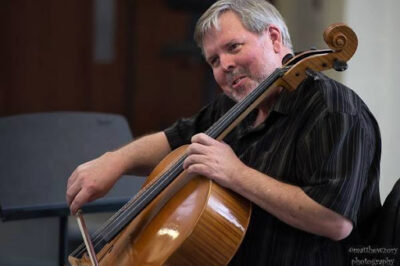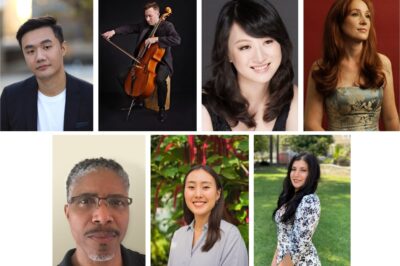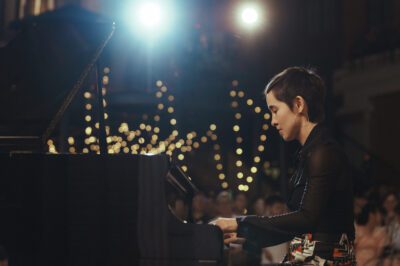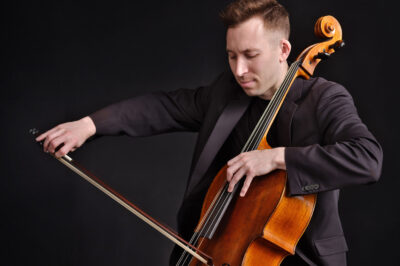Laura and Chris Stoutenborough: Summer Clarinet Camp 2017
As a young musician, I remember my excitement in attending a high school Honor Band weekend. It was a unique opportunity to meet other enthusiastic musicians, perform challenging music, learn from new teachers, and grow as a performer. My husband, Chris, also a professional musician, had similar pivotal enrichment experiences as a young musician. Now, as teachers, we were very excited to create a new summer clarinet camp, to share what we are passionate about with a new generation of enthusiastic students.
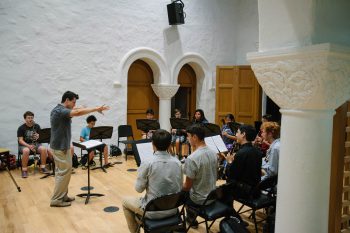
In planning each day, we created innovative ways to help each musician develop and improve foundational skills and musicianship, in more depth than typical lessons can provide. We wanted to provide hands-on tools to explore foundational concepts like breathing, embouchure, and articulation. We wanted students to explore clarinet fundamentals, including improving reeds and honing each musician’s sound by trying a variety of mouthpieces. Each student’s job was to focus on their own level of improvement throughout the day. We also wanted students to have the opportunity to perform for and learn from world-class guest teachers. We were fortunate to have some of the best musicians as our guest master class teachers, including Michele Zukovsky, former Principal Clarinet of the L.A. Philharmonic; Don Foster, Principal of the Santa Barbara and Pasadena Symphonies; and Yehuda Gilad, Professor of Clarinet at USC and The Colburn School.
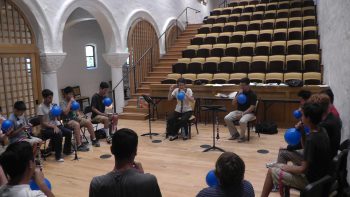
Each day included exercises for foundational concepts, chamber music, and a master class. Many of these foundational concepts involve muscles we cannot see, so we brought several tools to help students improve how they use their bodies. For example, each student was given an elastic band for their midsection, to improve muscle awareness as we worked on slow, deep, tension-free breathing. As students inhaled with more abdominal muscle movement, posture improved, and their sounds became thicker, richer, and more secure. We also added balloons to mouthpieces so students had visual feedback for how their air is moving. Once their air was moving more effectively, they played their clarinets immediately afterward, and heard the tremendous improvement in tone.
Embouchure is critical for sound, and often challenging to teach. Each student had the opportunity to try The Wind-o, a tool invented by Chris and used by musicians worldwide to help bring coordination, awareness, strength, and endurance for the muscles we most need as musicians. This exercise was key in helping students discover the difference between using chin muscles to “bite” the mouthpiece, and properly engaging the corners of the mouth to hold the mouthpiece and reed. We heard fantastic differences in tone quality, dynamic control, and even articulation, after using The Wind-o.
Articulation was one topic we approached in a variety of ways. First, we worked with pronouncing specific sounds, so students could learn how to hear the positioning of the tongue. We had also created special reeds with tiny rubber “targets” on the tip so that students could feel which part of their tongues touched the reeds. We used earplugs as another tool for students to listen to the sound of the tongue in a different way. Students were enthusiastic about these new exercises away from the clarinet, and these approaches for continuing to improve articulation.
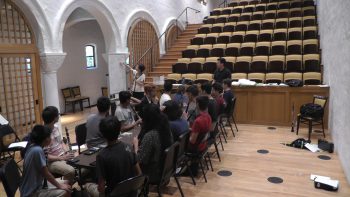
Students were thrilled to learn more about equipment, including learning how to work on reeds, and how to choose a mouthpiece. We were excited to provide each student with a set of reed working tools and instructions for using them. Small improvements to the reed make an enormous difference in responsiveness and tone. Students asked many great questions and mentioned it was a favorite part of the camp. Students were equally enthusiastic about the opportunity to try six different types of Vandoren mouthpieces. I demonstrated what to listen for since a mouthpiece must have a resonant “singing” quality, project the sound, and create a ringing tone in softer dynamics. Students whose initial question was, “Which mouthpiece is best?” quickly learned that each person sounds best on different equipment.
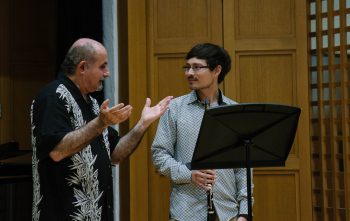
Master classes are an opportunity to perform one piece, often with piano accompaniment in front of an audience, and receive feedback from a master teacher. For many of our students, ages 13 to 20, this was a first-time experience, and a highlight of camp. Our first guest master class was with the inimitable Michele Zukovsky. Michele brilliantly helped students with nerves, discussed reeds, and emphasized phrasing and listening. Everyone got a sense of Michele’s wonderful sense of humor and her love for music. Hearing her teach, we were reminded that there are few performers with more orchestral experience than Michele and we were deeply grateful to have her share her knowledge and passion.
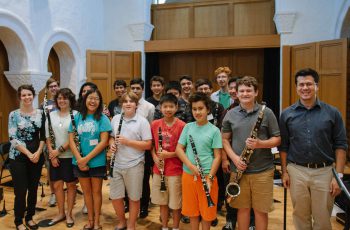
Don Foster, our next master class teacher, gave an inspiring master class, helping students bring their awareness to the big picture in performing. Expanding their focus to communicate the meaning of their pieces, and breathing in a way that improves expression of the music brought smiles of understanding to students’ faces. As a phenomenal musician and teacher, Don is gifted in helping students understand how to listen to the piano accompaniment and work to play together to enhance the piece. Each student came away with clear concepts for improvement.
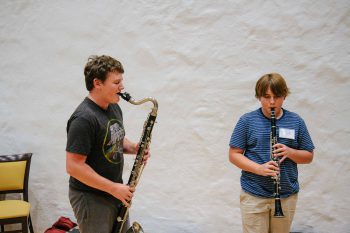
Yehuda Gilad taught an innovative and action-filled master class. His ability to find the heart of an issue and playfully help each student become musically freer was profound. To teach a concept, one student might use spitballs at one point; another walked around while playing; and a third did leg exercises with Yehuda. The results in student’s playing, after such seemingly unusual activities, were amazing. Yehuda guides students to find the joy in music, and we were honored and delighted to have him.
Playing chamber music each day in clarinet choir was another favorite activity of many students. On the last day, after our pizza party, all students performed in a concert. Two clarinet choirs performed, and some students performed solos with our fantastic pianist, U-Jung Jung, to a packed audience in Barrett Recital Hall. It was a wonderful chance for parents to hear what students worked on, and a fitting finale to a great week. We were so impressed by the thirst students had for making music and learning about the clarinet. We felt fortunate to work with such engaged students, and this camp was a highlight of our summer.
What did students write in their surveys? In their own words…
“Thank you so much for having this camp. It’s been amazing to meet other clarinetists in my age group, but also to learn from such great teachers. Thank you.”
“I loved learning how to shave my reeds! My life is saved. In all seriousness, I really valued the knowledge that our instructors shared with us. I had the chance to ask many questions.”
“I hope we have this camp again, it was a wonderful learning experience. Thank you Laura and Chris!”
“I enjoyed the whole camp and plan to share the camp with other clarinetists I know.”
“Make the camp longer.”
